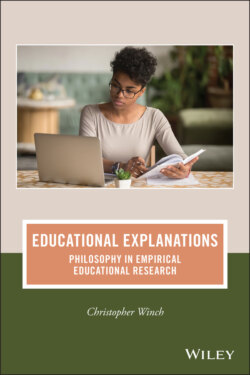Читать книгу Educational Explanations - Christopher Winch - Страница 8
1 Introduction: What Is the Question? THE PRINCIPAL CLAIMS OF THE BOOK
ОглавлениеMillions of pounds are spent on educational research each year in the UK alone.1 By far the greatest proportion of this expenditure is on research which is thought to have practical relevance to educational problems, and the vast majority of this is spent on empirical educational research (EER), that is educational research which examines and seeks explanations for actual or proposed educational practices or the kinds of activities, institutions or policies that prepare young people for life (Pring 2015, p. 27). Invariably, the aim of such research is not merely to gain understanding of these practices but to improve or replace them with better ones. This practical aspect of educational research exercises most commentators, although it should not be forgotten that educational research can be carried out in a relatively disinterested manner, out of intellectual curiosity (Hammersley 2006). There are two related issues to be considered here: (1) Is it possible to gain knowledge of how educational practices work? (2) Is it possible to use such knowledge to improve existing practices, replace existing ones with better ones or introduce practices which will improve the overall practice of education? In this book, both these questions will be addressed. If the answer to (1) is negative, then it is futile to address (2). By implication then the answer to (1) will be positive. The answer to (2) will not be negative, but there are degrees of positivity attached to a positive answer and what those degrees are will be crucial to the ultimate claims of the book.
It is no exaggeration to say that in recent decades educational research has undergone a crisis of confidence, particularly but not exclusively within the world of educational policymaking. Dissatisfaction has been expressed both with the quality and the usefulness of such research. Conceptual research on education tends to be regarded with some suspicion as something that is either of little practical value or which undermines existing practices. But empirical research fares little better, with scepticism expressed both about its quality (Tooley and Darby 1998) and about its applicability (Hillage et al. 1998). More recently there have been moves to tie funding to preferred approaches to empirical research such as intervention studies and randomised control trials (RCTs) and to disseminate in accessible form what the findings of such studies are and how they are relevant to the improvement of educational practice. In the UK alone we see organisations such as the Educational Policy Institute (EPI), the Educational Endowment Foundation (EEF), and the Sutton Trust, not to mention meta-researchers Robert Slavin and John Hattie gaining a significant amount of influence in the propagation of studies of ‘what works’ in educational practice. One should also mention the rising interest in the deliverances of educational research from within the teaching profession, such as ResearchEd in the UK, which betoken a wish by teachers to become more active consumers of and even participants in educational research and also to have a say in what counts as quality and relevant research. It is fair to say that the importance of educational research is growing, alongside the debates about its value. The questions that it raises, however, are complex and not fully understood either within the world of educational research itself or within the communities that commission, evaluate and use it.
In Teachers’ Know-How (Winch, C. 2017), I argued for a preferred conception of teachers as those who, among other things, bring to bear the fruits of the systematic study of education and educational practices on their own work. This systematic study includes but is not exhausted by empirical research in the sense described above. It is now time to further substantiate that claim by showing whether and how such research can positively inform teachers’ work. Within philosophy of education this is a problematic claim. The dominant conception of the teacher within the discipline is that of a craftworker whose primary assets are experience, intuition, commonsense, situational judgement and subject knowledge (e.g. Carr, D. 1999; Carr, W. 2004, 2005, 2006; Dunne 1993; Barrow 1984 for representative examples). On the other hand, there are also commentators who take a more positive view of the deliverances of educational research (e.g. Pring 2015). Like Pring I take the view that substantial philosophical work has to be done in order to intelligibly formulate questions amenable to EER. It follows therefore that in order to make out a case for the potential usefulness of such research, philosophical clarity about its possibility, scope and limits needs to be achieved. This is one of the main objectives of this volume, mainly concerned with question (1). Empirical educational research is enormously varied and, in order to answer (2) we will need to consider a variety of styles of EER in order to arrive at a balanced picture of its value and limitations for the work of teachers and educators more generally. This latter objective will be achieved in no small measure by examination of a series of case studies, which will occupy Chapters 9–12.
Before we arrive at that point however, some substantial philosophical issues, located broadly within the philosophy of the applied social sciences, will need to be addressed. These issues can be summarised as follows:
(i) Does it make sense to talk of an educational reality?
(ii) Does it make sense to talk of educational truth and falsity?
(iii) If there are such things as educational truths, is it possible for us to know them?
(iv) If we can know them, can they be used in educational practices such as teaching?
The first claim needs to be answered before the second can, the second before the third and the third before the fourth. Failure at any point in the chain of justification will jeopardise the overall claim of the book.
